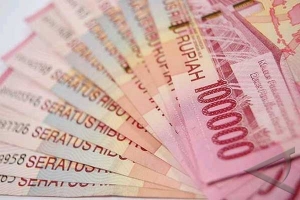Rupiah melemah karena utang jatuh tempo
Senin, 30 September 2013 10:20 WIB | 2173 Views
Beredarnya spekulasi terhadap perusahaan domestik yang membutuhkan dolar AS untuk kebutuhan pembayaran utang jatuh tempo di akhir bulan dan akan adanya pembayaran barang-barang impor mendorong mata uang dolar AS meningkat...
Nilai tukar rupiah yang ditransaksikan antarbank di Jakarta pada Senin pagi bergerak melemah sebesar 70 poin menjadi Rp11.400 dibanding posisi sebelumnya di Rp11.330 per dolar AS.
"Beredarnya spekulasi terhadap perusahaan domestik yang membutuhkan dolar AS untuk kebutuhan pembayaran utang jatuh tempo di akhir bulan dan akan adanya pembayaran barang-barang impor mendorong mata uang dolar AS meningkat nilainya sehingga turut memengaruhi pelemahan rupiah," kata Kepala Riset Trust Securities, Reza Priyambada, di Jakarta, Senin.
Sentimen negatif lainnya, lanjut dia, berupa imbas pernyataan beberapa petinggi The Fed bahwa pemberlakukan pengurangan stimulus keuangan pada Oktober 2013.
Meski demikian, ia memperkirakan tekanan pada mata uang rupiah cenderung dapat dibatasi oleh Bank Indonesia (BI). BI akan menjaga fluktuasinya agar tidak terlalu tinggi.
Pengamat pasar uang lainnya, Ruly Nova menambahkan sentimen pasar uang saat ini masih cenderung negatif terutama dari eksternal, sehingga membuat mata uang domestik cenderung tertekan terhadap dolar AS.
Ia mengharapkan data-data ekonomi Indonesia yang akan dirilis pada awal bulan Oktober mendatang dapat menjadi sentimen positif bagi pasar keuangan domestik.
Menurut dia, jika inflasi dan defisit neraca perdagangan Indonesia membaik maka dampak negatif dari sentimen eksternal dapat sedikit mereda. Sejauh ini, pemerintah telah berusaha untuk memperbaiki neraca transaksi berjalan agar defisit tidak semakin membesar.
Editor: Ella Syafputri
COPYRIGHT © 2013
++++++
http://www.thejakartaglobe.com/business/floundering-rupiah-means-high-inflation-here-to-stay/
Floundering Rupiah Means High Inflation Here to Stay

DBS Bank forecasts the consumer price index in September at 9.4 percent, after rising by 8.79 percent in August, the fastest pace since January 2009. (Reuters Photo/Enny Nuraheni)
Inflation is likely to remain high in September because of lingering effects from subsidized fuel price increases a few months ago and of a weakening rupiah that is pushing up costs of imported goods, analysts say.
"Inflation numbers out of Indonesia will remain elevated for a while longer, due to base effects and also the recent weakening of the rupiah," said Gundy Cahyadi, an economist at DBS Bank in Singapore.
DBS Bank forecasts the consumer price index in September rising 9.4 percent year on year, Gundy said, compared to an increase of 8.79 percent in August, which was the highest since January 2009. Inflation and trade data will be released by the Central Statistics Agency (BSP) on Tuesday.
Indonesia has seen its inflation rate climb after the government raised the price of subsidies for low-octane gasoline and diesel by an average 33 percent in June. The rupiah has also fallen sharply against the dollar in the past few months, bringing its decline this year to more than 19 percent.
"The double-digit depreciation in the rupiah since May has led to an upward revision of prices in general," Gundy said. "Although anecdotal evidence points towards some stabilization in prices so far in September, the year-on-year inflation will still be elevated. It is likely to fall more markedly beginning in November or December."
DBS Bank is forecasting year-end inflation at around 8.5 percent.
Bank Indonesia on Sept. 12 raised its key interest rate by 25 basis points to 7.25 percent, for total increases of 1.5 percentage points since June. The tighter monetary policy was partly intended to support the rupiah by making Indonesian assets more attractive to offshore investors. On Friday, the central bank raised banks' secondary reserve requirements in a bid to curb loans and further aid the rupiah.
The central bank's next monetary policy meeting is on Oct. 8, and Gundy said, "We think BI is likely to take a pause in its monetary tightening during the next meeting, while closely watching developments in financial markets."
Indonesia, the biggest economy in Southeast Asia, has been hit by fund outflows in recent months on concerns over its worsening current account deficit and soaring inflation.
The central bank has been heavily defending the rupiah and has spent billions of dollars to support the currency, which touched last week at its weakest level since April 2009. Bank Indonesia's foreign reserves fell to $92.9 billion in August from $112.8 billion in December, after peaking at $124.6 billion in August 2011.
| Reply via web post | Reply to sender | Reply to group | Start a New Topic | Messages in this topic (1) |
to Subscribe via email :
batavia-news-subscribe@yahoogroups.com
----------------------------------------
VISIT Batavia News Blog
http://batavia-news-networks.blogspot.com/
----------------------------
You could be Earning Instant Cash Deposits
in the Next 30 Minutes
No harm to try - Please Click
http://tinyurl.com/bimagroup
--------------

No comments:
Post a Comment